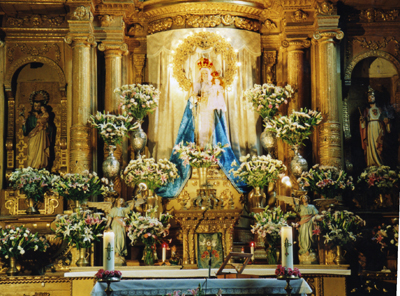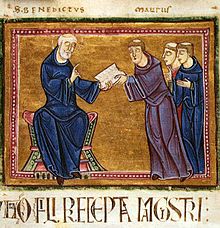St. Ignatius Loyola at Manresa
The youngest son of minor nobility, Ignatius at a very young age entered the clergy, but was soon released from religious life and instead became a soldier. At the age of 20, Ignatius suffered serious wounds to both legs and endured a long and painful convalescence at his family's castle. Greatly weakened by his injuries, Ignatius recovered slowly, and, since his family's library did not include the chivalric romances he preferred, Ignatius passed the time by reading the only available books, which were lives of Christ and the saints. Ignatius quickly resolved to imitate the saints he'd been reading about, and, according to his autobiography, was granted a vision of Our Lady and the child Jesus which filled him with joy and left him with a loathing for his past sins. Once his legs healed, Ignatius spent an extended period of prayer and fasting at Manresa, and then set out for the Holy Land. During the voyage, Ignatius faced many dangers and pains. Upon his arrival, the Franciscans, who had charge of the holy places, commanded Ignatius to leave immediately, since the danger of his being captured and held for ransom was very great. Ignatius returned to Spain, and for the next 15 years, devoted himself to study while gradually working out his plan for serving Christ. During this time Ignatius suffered many trials and deprivations, including imprisonments, slander, abandonment by followers, accusations of heresy, and even beatings. St. Ignatius endured these patiently, and finally, in 1540 AD, "Regimini militantis Ecclesiae," the bull sanctioning Ignatius' Society of Jesus, was issued. In conformity with Ignatius' highly original and even inspired conception, members of Ignatius' Society, in contrast to most other religious congregations, do not wear a distinctive habit, do not pray in choir, and do not accept ecclesiastical dignities. They also must undergo a much longer period of probation. Over the centuries, these sons of Ignatius have accomplished many great things, but have also occasioned a great deal of controversy. We pray that Ignatius' followers return to imitating their founder's patience, devotion and sanctity.
From St. Ignatius's Spiritual Exercises:
First Rule. The first: All judgment laid aside, we
ought to have our mind ready and prompt to obey, in all, the true Spouse of
Christ our Lord, which is our holy Mother the Church Hierarchical.



.jpg)











